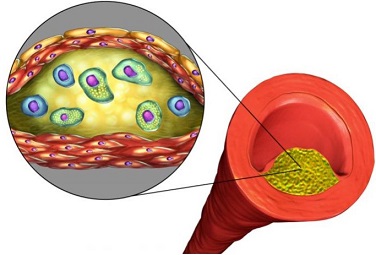BREAKING Medical News! Study Discovers That Memory CD8 T Cells Causes Atherosclerosis In The Aged By Promoting Plaque Buildup Of The Arteries!
Nikhil Prasad Fact checked by:Thailand Medical News Team Dec 14, 2023 1 year, 4 months, 6 days, 8 hours, 18 minutes ago
Medical News: In a groundbreaking stride at the intersection of immunology and cardiovascular health, recent medical research has brought to light a previously undisclosed connection between memory CD8 T cells and atherosclerosis in the aging population. Aging, recognized as a significant risk factor for the perilous accumulation of arterial plaque, not only triggers biological changes but also induces a buildup of memory CD8 T cells in both mice and humans.
 Memory CD8 T Cells Contributing To Plaque Buildup In Arteries.
Memory CD8 T Cells Contributing To Plaque Buildup In Arteries.
Atherosclerosis, characterized by the insidious buildup of plaque in arteries, remains a leading cause of heart attacks and strokes, contributing to nearly one-third of global mortality.
Research Breakthrough: Unmasking the Role of CD8 T Cells
Conducted by a collaborative team of researchers from the esteemed University of Alabama at Birmingham and the University of Michigan, this study covered in this
Medical News report, aims to untangle the intricate web of interactions between CD8 T cells, aging, and atherosclerosis.
Despite the well-established link between aging and heightened vulnerability to atherosclerosis, the precise role of CD8 T cells in this process has remained elusive. The recent findings, however, illuminate the indispensable contribution of CD8 T cells to the enhancement of atherosclerosis in aging individuals, positioning these memory cells as potential therapeutic targets for mitigating this condition in older adults.
A Unique Experimental Odyssey
Diverging from conventional mouse models for atherosclerosis, the researchers implemented a distinctive approach. Instead of relying on mice with perpetually elevated blood lipid levels, they initiated atherosclerosis by introducing an enzyme that degrades a receptor for low-density lipoprotein particles (LDL). Subsequently, a ten-week regimen of a high-fat Western diet was introduced to elevate blood lipid levels and induce atherosclerosis. Crucially, this ten-week period could be initiated either in young mice or in older mice after a lifetime of normal blood lipid levels.
CD8 T Cells Take Center Stage
The study showcased the pivotal role of aging-mouse CD8 T cells in atherosclerosis through two distinct experiments. Firstly, the researchers employed an antibody to deplete CD8 T cells in both old and young mice before initiating the disease process. The result was a noticeable reduction in atherosclerosis in aged mice, while the same depletion had no discernible impact on the younger cohort. Secondly, the transfer of spleen CD8 T cells from healthy aged mice into recipient mice lacking CD8 T cells significantly escalated atherosclerosis, underscoring the pro-atherogenic nature of these memory cells.
Illuminating the T Cell Landscape
Delving into the intricacies of T cell dynamics with age, the research team created a comprehensive atlas detailing how T cells evolve in disease-free spleens and atherosclerotic plaques in mice. Leveraging single
-cell RNA sequencing, the researchers uncovered alterations in gene expression and distinct CD8 T cell types. Notably, the CD8 T cells accumulating in atherosclerotic plaques in aging mice were primarily memory T cells, exhibiting cytotoxic gene expression. A significant presence of effector memory T cells expressing granzyme K, an enzyme with cytotoxic properties, further emphasized the immune system's active role in atherosclerosis.
Bridging the Species Gap: Relevance to Humans
Comparing the mouse data with a previous single-cell RNA sequencing study in older adults, the researchers discovered striking parallels. Most T cells within human atherosclerotic plaques were memory subtypes, demonstrating higher cytotoxic and inflammatory traits in symptomatic patients compared to asymptomatic individuals. This cross-species resemblance underscores the translational relevance of the study's findings to humans, opening new avenues for understanding and combating age-related cardiovascular diseases.
Key Highlights Unveiled
-Increased CD8 T Cell Clonal Expansion: T cell receptor sequencing uncovered heightened CD8 T cell clonal expansion with aging and within atherosclerotic plaques, shedding light on the dynamic nature of the immune response.
-Altered CD8 Cell Transcription in Atherosclerosis: Aging was found to exert a discernible influence on CD8 cell transcription within the context of atherosclerosis, providing critical insights into the molecular underpinnings of immune system changes.
-Upregulation of Chemokine Receptors: The study identified a notable upregulation of chemokine receptors in atherosclerosis, suggesting a potential avenue for targeted interventions.
-Role of Gamma-Delta T Cells: About one-third of atherosclerotic T cells were identified as gamma-delta T cells, sparking intrigue into their role in atherogenesis and signaling the need for further exploration.
Implications and Future Prospects
The study's findings extend beyond unraveling the complexities of the immune system's role in age-related diseases; they beckon transformative advancements in cardiovascular health and aging research. Identifying memory CD8 T cells as potential therapeutic targets opens new doors for the development of T cell-based therapies designed to treat and prevent atherosclerosis in older adults. This breakthrough not only adds nuance to our understanding of the immune system's role in chronic diseases but also provides tangible avenues for clinical exploration and intervention.
In conclusion, this study serves as a pivotal milestone, reinforcing the critical need to decode the immunological intricacies governing age-related diseases. As the medical community delves deeper into the ramifications of memory CD8 T cells in atherosclerosis, the promise of innovative therapies and preventive strategies for age-related chronic diseases looms on the horizon, heralding a new era in personalized medicine and geriatric care.
The study findings were published in the peer reviewed journal: Nature Aging.
https://www.nature.com/articles/s43587-023-00515-w
For the latest
Medical News, keep on logging to Thailand Medical News.
